A Crisis of Trust
If equity analysts at Sri Lankan investment banks and brokerages had any of their pay linked to performance last year, many would have ended up being rather poorly paid. When the market reached its heady high of 7,700 index points and trailing price to earnings ratios were topping 22 times, only a few analysts were […]
If equity analysts at Sri Lankan investment banks and brokerages had any of their pay linked to performance last year, many would have ended up being rather poorly paid. When the market reached its heady high of 7,700 index points and trailing price to earnings ratios were topping 22 times, only a few analysts were urging their clients to run for the door. Instead research reports continued to extol virtues of firms that have since seen their share prices tumble.
Of course nobody cared what analysts thought during the post war bull market when the focus was purely on borrowing and deploying the money on stocks as quickly as possible. But the tables turn when markets fall, and investors are forced to seek out alpha or firms that will outperform the market. In bear markets an industry that is reluctant to recommend selling may suffer the wrath of value investors, who tend to dominate such markets. Of course the fearlessness of some analysts has stood in stark contrast to the spineless majority, but brokerages represented by bold stock pickers accounted for rather little of the turnover during the bull run. For investors – the returns from following the advice of analysts would have been meager.
After the market crash and as investors try to steady their portfolios, analysts should start regaining some of their clout; theoretically. However investment banks and brokerages appear to be facing far deeper and fundamental challenges according to, Sri Lanka’s top all star team of stock pickers who were part of Hong Kong based investment bank Jardine Fleming’s local unit. They are urging a period of soul searching, moral rectitude and investment in talent to eliminate the conflicts of interest that have bedevilled the industry in the last decade and regain trust.
Jardine Fleming, founded in the 1970s as a joint venture between Jardine Matheson and Robert Fleming & Co operated a Sri Lankan investment banking unit from 1993 to 2000 up to the time of its sale to JP Morgan Chase in 2000. It wasn’t the only international investment bank at the time. A joint venture of CT Holdings PLC and Smith New Court (Far East) Ltd.; owned C T Smith while Crosby Securities, W I Carr and Dutch ABN Amro also had operations here on a somewhat smaller scale.
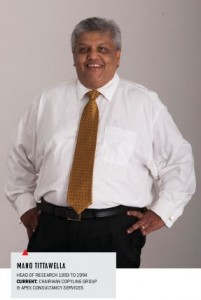 Jardine Fleming’s equity research however set it apart. “One of the big contributions they made to the Sri Lankan market was their major focus on research,” says Mano Tittawella who headed Jardine’s research unit in the early days here. The period from 1993 to 2000, saw a full market cycle starting with a bull market and ending with a monumental crash. Of course the Sri Lankan market was tiny then even compared to the region. Market capitalization now tops Rs1,800 billion which is 23 times more than the Rs80 billion capitalization in 2000. Despite being diminutive, equity research teams were punching above their weight and Jardine Fleming’s local unit in particular led an almost decade long equity research renaissance.
Jardine Fleming’s equity research however set it apart. “One of the big contributions they made to the Sri Lankan market was their major focus on research,” says Mano Tittawella who headed Jardine’s research unit in the early days here. The period from 1993 to 2000, saw a full market cycle starting with a bull market and ending with a monumental crash. Of course the Sri Lankan market was tiny then even compared to the region. Market capitalization now tops Rs1,800 billion which is 23 times more than the Rs80 billion capitalization in 2000. Despite being diminutive, equity research teams were punching above their weight and Jardine Fleming’s local unit in particular led an almost decade long equity research renaissance.
 “Frontier markets were fashionable. So it was like virgin territory and they were looking more at market performance in terms of the appreciation of the indices against actual volumes,” explains Tyron De Silva who was seconded to Jardine at its launch by his employer DFCC, a development bank. DFCC and HNB, a commercial bank, were joint venture partners of Jardine in Sri Lanka. Edward White, an expatriate, was the unit’s first chief executive during a time when Sri Lanka’s economy exuded confidence. Echelon Square was transformed as the center for capital markets with the stock exchange and financial firms moving in to the World Trade Center. Firms like Sampath Bank and United Motors made IPO’s, foreign investment was picking up and “they looked at this as an opportunity to have a foot in if things take off,” De Silva who is now Senior VP of Corporate and Investment Banking at DFCC Bank speculates.
“Frontier markets were fashionable. So it was like virgin territory and they were looking more at market performance in terms of the appreciation of the indices against actual volumes,” explains Tyron De Silva who was seconded to Jardine at its launch by his employer DFCC, a development bank. DFCC and HNB, a commercial bank, were joint venture partners of Jardine in Sri Lanka. Edward White, an expatriate, was the unit’s first chief executive during a time when Sri Lanka’s economy exuded confidence. Echelon Square was transformed as the center for capital markets with the stock exchange and financial firms moving in to the World Trade Center. Firms like Sampath Bank and United Motors made IPO’s, foreign investment was picking up and “they looked at this as an opportunity to have a foot in if things take off,” De Silva who is now Senior VP of Corporate and Investment Banking at DFCC Bank speculates.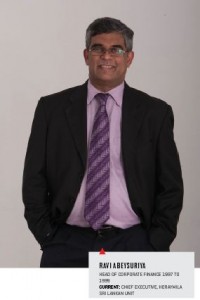
However Jardine Fleming’s equity and corporate finance teams operated in a climate quite unlike today’s market conditions where a band of barbarians – with powerful political affiliations – are holding the stock market to ransom.
Over the past year as a result, crimes affecting Colombo’s small stock market have seriously eroded confidence in its integrity. Scandal after scandal has dogged the market and the apparent erosion of the regulator’s ability to act independently in the face of blatant market manipulation, insider trading and challenges to its authority have all contributed to the crisis. The crisis has been exacerbated by economic hardship, rising interest rates and confidence sapping general deterioration in law and order.
This crisis had been unfolding for some time due to a number of reasons. Under siege, the regulator has been unable to crack down on insider trading. Excessive credit to unwary investors, governance issues at state controlled investment funds with exposure to the stock market and a complex web of self interest and nepotism have all contributed to eroding trust in the market. However in the analysis the role some investment advisors or stock brokers have played in exacerbating the crisis perhaps deserves greater scrutiny than it has received.
When financial markets crash many sections of the economy are affected; not least the ones that ended up owning stock of companies whose share prices have collapsed. Now that listed shares at the Colombo Stock market are off their heady highs, ramifications are being felt widely. Some of these seemingly overvalued shares are held by public pension funds purchased when prices were at the peak. Demands for accountability and transparency, about investment rationale and performance have been met with cavalier arrogance.
This toxic and destructive approach to governance has spread to the capital markets. “I think Sri Lanka has deep issues. It is coming from the governance of the whole country – there is deterioration, so people don’t see what’s wrong,” says Middle Eastern asset management firm Heraymila Investment’s Chief Executive of the Sri Lankan unit, Ravi Abeysuriya. “Violating rules here has no expense. If you violate something there has to be consequences. When there are none and you get away with it easily, people take that route, because human greed is always there- everybody wants to make money and that’s where things go wrong,” says Abeysuriya who was also the founding chief executive of ratings agency Fitch’s local office.
Behaviour is driven by primal ambition, aggressiveness, competitiveness and individual drive for power. Often a framework of laws & regulations, ethical practices and morals work in preventing an abuse of the system. When it becomes apparent that leaders have a wonky moral compass and are flip flopping on values – those publicly preached and privately practiced – the message of those behaviours are transmitted to the rest of society and quickly become part of the culture.
The past few years have not been kind to many equity research analysts. For a start most investors didn’t care to check what analysts thought because the market saw an unprecedented boom. Secondly and more embarrassingly their false and rosy predictions about the sustainability of a bubble have left them red faced. However not everybody got carried away. A few brokering houses, investment banks and independent equity research units did advice clients to run for the door but only a few, mostly mutual funds, were willing to listen to sane voices.
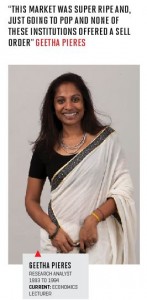 Tackling the crisis of trust bedevilling equity analysts and the market is complex due to three reasons. Firstly during the bubble the primacy of investment banking and brokerage sales to profit was so great that integrity of research departments were compromised by traders and financiers keen not to offend clients. “Why was there no sell order? That is my issue. This market was super ripe and, just going to pop and none of these institutions offer a sell order,” Jardine equity analyst Geetha Pieres asks.
Tackling the crisis of trust bedevilling equity analysts and the market is complex due to three reasons. Firstly during the bubble the primacy of investment banking and brokerage sales to profit was so great that integrity of research departments were compromised by traders and financiers keen not to offend clients. “Why was there no sell order? That is my issue. This market was super ripe and, just going to pop and none of these institutions offer a sell order,” Jardine equity analyst Geetha Pieres asks.
Tyron De Silva, one of the pioneers at the Jardine unit argues “research was fairly patchy; I have never seen someone who has projected a drop in profits. I’ve never seen that,” he muses. “Balance sheet analysis is fairly poor, and nothing on working capital. Everyone goes for an Excel based thing…, just plugging in a 10% or something growth.”
“I presume if they do have the negative story they choose not to report it,” concludes De Silva who does not agree that skewed research will be entirely discounted by the market. He points out that market wide credibility has been eroded after analysts fell over each other to recommend the IPO’s of Softlogic Holdings and Expo Lanka. Forecast EPS for Softlogic Holdings for 2012 by Asia Wealth, CT Smith, John Keells Stockbrokers, BMS and Lanka Securities ranged from Rs2.98 to Rs1.7 for the year, but the actual was Rs0.66 a variance of up to 450%. Its oversubscribed IPO was priced at Rs29 a share which now trades at Rs9.40. Similarly some analysts offered a rosy outlook for Expo Lanka IPO of Rs14 a share. Forecast by John Keells Stock, Asia Securities, Heraymila, CT Smith and BMS were 190% to 148% above the actual. Expo Lanka shares are now trading at less than half the IPO price at Rs5.90. “Market needs a bit of credibility, which it lost especially after some of the recent IPOs,” contends De Silva.
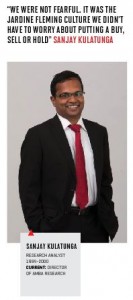 Sanjay Kulatunga, who had a long stint at JF from 1994 to 97 and a further two years at its Hong Kong head office, recalls advising JF clients to not subscribe to the Lighthouse Hotel IPO in 1997. “We told our clients the valuations were not right and they might be able to buy it cheaper in the secondary market,” he recalls. “We were not fearful. It was the JF culture we didn’t have to worry about putting a buy, sell or hold,” says Kulatunga who is now a Director of Amba Research, an outsourced financial analysis provider promoted by a team of equity analysts from international investment banks including JF. Kulatunga was instrumental in convincing the founders to set up Amba’s incubator operation in Colombo, given his belief that Sri Lanka offered the best talent pool in the space that can work on par with their international peers.
Sanjay Kulatunga, who had a long stint at JF from 1994 to 97 and a further two years at its Hong Kong head office, recalls advising JF clients to not subscribe to the Lighthouse Hotel IPO in 1997. “We told our clients the valuations were not right and they might be able to buy it cheaper in the secondary market,” he recalls. “We were not fearful. It was the JF culture we didn’t have to worry about putting a buy, sell or hold,” says Kulatunga who is now a Director of Amba Research, an outsourced financial analysis provider promoted by a team of equity analysts from international investment banks including JF. Kulatunga was instrumental in convincing the founders to set up Amba’s incubator operation in Colombo, given his belief that Sri Lanka offered the best talent pool in the space that can work on par with their international peers.
Jardine’s management and sales staff tracked how analysts performed against earnings forecasts. “If you are continuously giving dumb recommendations, people cut the line on you,” he says referring to regular contact analysts had with global sales staff and fund managers. “You were accountable for your recommendations,” contends Kulatunga who due to his role as a former SEC Commissioner of Sri Lanka didn’t wish to be drawn in to commenting about current investment research practices here. Kulatunga quit his SEC role on the same day Chairman Thilak Karunaratne resigned.
Economic activity began to soften in the late nineties, and frontier economies Sri Lanka was grouped together with, started pulling ahead. Foreign brokerages who market Sri Lankan stocks to mutual funds and pension funds started pulling out. Heraymila, a Middle Eastern wealth management firm and IIFL and Religare, two Indian investment banks, have since entered the market. However global investment banks haven’t still shown they are about to re-enter the market. “What’s fundamentally needed are professional brokerages with international repute who have the exposure and global distribution networks,” contends Kulatunga.
Ethical standards have also deteriorated at brokerages since Jardine’s halcyon times when Chinese walls protected analysts’ from investment banking client interest. “Analysts were like this,” demonstrates Geetha Pieres, cupping her hand over a clenched fist, implying the pervasive and overriding influence the equity research team commanded at the firm.
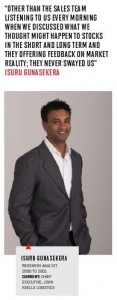 Isuru Gunasekera, a JF research analyst during its last year and half here when it was taken over by JP Morgan, has similar impressions. “Other than the sales team listening to us every morning when we discussed what we thought might happen to stocks in the short and long term and they offering feedback on market reality; they never swayed us,” recalls Gunasekera who now heads John Keells Logistics, a supply chain management firm for Keells Supermarkets and other clients.
Isuru Gunasekera, a JF research analyst during its last year and half here when it was taken over by JP Morgan, has similar impressions. “Other than the sales team listening to us every morning when we discussed what we thought might happen to stocks in the short and long term and they offering feedback on market reality; they never swayed us,” recalls Gunasekera who now heads John Keells Logistics, a supply chain management firm for Keells Supermarkets and other clients.
To be fair, analysts are often young graduates looking for a kick start to a capital markets career and are usually an underequipped lot. Because of the subjugation by overbearing investment bank chief executives, the whole industry of equity research has lost its aura, its credibility and ability to influence markets.
Of course there have been whimpers of protest about the perils of pump and dump and advice to ‘only invest in fundamentally strong counters’ but that falls far short of good advice. Any confident analyst would have encouraged clients to significantly reduce equity exposure or be heavily underweight on stocks. But the young bucks had not seen a market cycle in their careers and certainly lacked the experience to make a bold call. They also seem to have been hired for just those reasons; to profit from their incompetence. Brokerages had the respect attached to having a research department but also had a unit that – due to its inexperience – didn’t impede the dizzy pumping of stocks.
Some analysts have also been cosying up to investment banking clients but the practice hasn’t raised howls of protest. In fact it isn’t unusual for analysts here to moonlight as investment bankers deftly switch back to their official role and offer a rosy recommendation on their client’s stock with a wink or a nod. 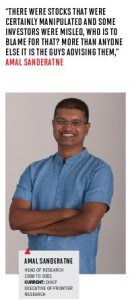
One time US State of New York Attorney General Eliot Spitzer made as his career goal the prosecution of perceived collusion, conflict of interest and other wrongdoings of investment banks, mutual funds and insurance companies. Often the accused agreed to pay hefty fines to settle instead of having their dirty laundry aired in court and face the wrath of US media scrutiny. District Court Judges here, where securities fraud or similar cases are tried, are perhaps relatively underequipped compared to New York counterparts and Sri Lankan media- where perverse relationships, conflicts of interest and pandering abounds – are easily subjugated. What followed with Eliot Spitzer’s muck racking in the US was a deal called the “Global Settlement” that forced investment to put up shields between their equity analysts and their investment banking colleagues.
Ravi Abeysuriya says investment banks running the book for IPOs have to be up to scratch with their due diligence. “Any IPO almost, is approved by the SEC, but it is the investment bank that does the due diligence, does the valuation and has to make sure there is fair play,” he argues. “Investors also need to get something out of an IPO but if it’s overpriced, the company may benefit in the short term but investors won’t.” In a mad frenzy retail investors snapped up any and all IPOs without examining the credential or thoroughness with which investment bankers had dealt with these. “Some of those IPOs were overpriced drastically,” he claims, “That’s the issue; the lack of regard for reputational damage,”
At Jardine, Abeysuriya, who was head of corporate finance, practiced what he now preaches. Jardine was courted by Uni-Walkers for an IPO. JF did the due diligence, and found then that the firm had serious financial issues. “I refused to do the IPO, but I don’t think these days people act like that. We maintained very high integrity and standards which we never compromised – because once you lose reputation you can’t bring it back.” Uni-Walkers subsequently got into serious financial difficulty and more or less went bankrupt. It has since been acquired by Softlogic Holdings.
Virtue as its own reward is for the brave and not a path treaded by Lankan brokerages. “There is a major deterioration of standards. Ethics matters- that’s the key I would say and there has to be a more conscientious effort to bring in back that value system- it’s the people- the people in these organisations need to understand that money is not everything,” says Abeysuriya whose avowed aim is to replicate the JF research ethos at Heraymila.
This serious breakdown of ethics and the pooh-poohing of that impact by chief executives and managers at investment banks and brokerages is perhaps the second crisis of trust bedevilling equity analysts and investment banks. “Reputation is so important because you are working with other peoples’ money,” points out Abeysuriya who led the corporate finance division at JF. “It’s the parent company that put in place processes to ensure what goes on in corporate finance isn’t known by the research or sales teams. “That rarely happens now because people don’t understand what conflict of interest is.”
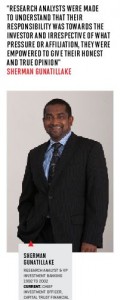 Jardine made sure analysts understood their responsibility to investors according to Sherman Gunatillake, one of JF’s first equity analysts. “Based on our recommendations people invested money and that money is often pension funds or retirement benefits of people,” explains Gunatillake. “So the research analysts were made to understand the responsibility of their job and their responsibility towards the investor and irrespective of what pressure or affiliation, they were empowered to give their honest true professional opinion to the investors. You were taught to tell the truth.”
Jardine made sure analysts understood their responsibility to investors according to Sherman Gunatillake, one of JF’s first equity analysts. “Based on our recommendations people invested money and that money is often pension funds or retirement benefits of people,” explains Gunatillake. “So the research analysts were made to understand the responsibility of their job and their responsibility towards the investor and irrespective of what pressure or affiliation, they were empowered to give their honest true professional opinion to the investors. You were taught to tell the truth.”
Retirees will suffer when state pension fund managers betray this trust. EPF losses on stock market investments when prices were at their peak tops Rs11 billion according to reports. “If you look at the EPF portfolio there are lots of speculative or so called junk stocks now,” points out Abeysuriya. “A long term investor should not have that kind of a portfolio, so clearly we see a deterioration of the quality of management. Long term pension funds should have an investment policy statement and strategy in keeping with their mandate.” He points out that even if share prices as a whole decline, fundamentally strong companies will continue to be profitable, which isn’t likely to be the case with speculative stocks.
The lack of a credible institutional investor base has posed market challenges for years. EPF – so far the largest institutional investor – has now invested around 8% of its over trillion rupee fund base in stocks. It continues to hold speculative shares while recently it sold stakes in the bluest of blue chips in its portfolio to attract foreign inflows when the island was in the throes of a balance of payments crisis. The sale of JKH and Aitken Spence shares may have shored up the BOP, but EPF members as a result may receive lower returns on their retirement savings and in the process pay unfairly for overall economic mismanagement.
Many smart fund managers, of mutual funds and corporate portfolios, shifted client investments to bonds or cash as the market became frothy. Avancka Herat, Executive Director and Chief Investment Officer of Namal, a mutual fund manager controlled by Union Bank, says “there is this whole segment of regulated market participants who are not participating.” Herat used to manage the portfolios of Distilleries group and Sri Lanka Insurance as Chief Investment Officer of Aegis Fund Management. He headed corporate finance at JF and from 2002 to 2009 managed Distilleries PLC and Sri Lanka Insurance portfolios which at one time topped Rs100, making him the largest private sector portfolio manager in Sri Lanka at that time. Herat contends deregulation should lead to greater private sector participation in pension fund management. “If you do not deregulate in pensions and mutual funds, the long term segment won’t account for a significant component in the market. And if they were significant and you regulate them, the market is automatically regulated,” says the fund manager who achieved a 22% annual return on a life insurance portfolio with a 30% ceiling on equity investments.
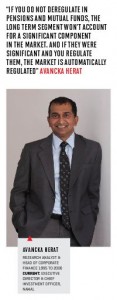 Instead a group of highly leveraged stock traders– referred to by the former SEC Chairman Thilak Karunarathne as a ‘mafia’ – has replaced the regulated institutional investor segment in the market. Traders are leveraged and they look for arbitrage; they are a different segment to retail investors. “Traders want to push prices up and dump on the retailers,” points out Herat. He says retail investors will be much better off investing through mutual funds – which by and large due to their superior fund management skills – bought stocks at their lowest prices and sold most of those shares before the market crashed. In the mutual fund industry, holdings of listed shares have declined to 42% of assets by end 2011 from as high as 60% in 2009.
Instead a group of highly leveraged stock traders– referred to by the former SEC Chairman Thilak Karunarathne as a ‘mafia’ – has replaced the regulated institutional investor segment in the market. Traders are leveraged and they look for arbitrage; they are a different segment to retail investors. “Traders want to push prices up and dump on the retailers,” points out Herat. He says retail investors will be much better off investing through mutual funds – which by and large due to their superior fund management skills – bought stocks at their lowest prices and sold most of those shares before the market crashed. In the mutual fund industry, holdings of listed shares have declined to 42% of assets by end 2011 from as high as 60% in 2009.
“You can’t get a trader to submit a P&L, you can’t expect a trader to have a compliance officer. But you can regulate intermediaries and pensions and until those reforms happen and they become a large component percentage holding in market cap, you will see this tug o war and irrational behavior,” Herat says.
Jardine Fleming’s Colombo unit had a trained compliance officer who strictly enforced ethical practices to protect client interest. Many brokerages here now follow the rule – requiring them to have a compliance officer – in the breach. “All these broking houses have only an accounting officer or some joker as the compliance officer who doesn’t know what they are talking about,” contends Abeysuriya. So discredited are analysts, some institutional fund managers bypass the widely distributed wares, turning to specialist firms instead.
One such specialist is Amal Sanderatne Chief Executive of Frontier Research, an independent outfit, who believes some research being skewed is unwitting, but a perverse incentive structure also plays a role. “There were stocks that were certainly manipulated and some investors were misled, who is to blame for that? More than anyone else it is the guys advising them,” he says. Sanderatne’s outfit earlier provided research on an outsourced basis for Capital Alliance Securities where he often also gave negative forecast for companies. Research at Capital Alliance – now spearheaded by its own team, continues to be in demand among value investors. Since the bubble popped, serious brokerages have come in to the reckoning. One explanation for the revival of influence is that investors seem to be placing a higher value on research according to Sanderatne. “If we did have good research there would be much more interest from foreign fund managers because the market is much larger, so good research can be a competitive advantage,” he says comparing against the market capitalization from 12 years ago.
The third – crisis of trust bedevilling equity analysts and investment bankers – is perhaps that it has been all too easy for companies to influence those who cover its stock. Often analysts now don’t engage senior executives of companies they cover in contrast to JF. When they do, an unsupervised young analyst can be easily misled by the charms of a wily chief executive who is under pressure to boost the stock price. Jardine was able to overcome this because it had regional specialists on every industry. “Although there is a country head, we were reporting directly to the regional researcher,” points out Sherman Gunatillake.
When companies realise they are about to have a disappointing earnings season, they start avoiding analysts and nosy reporters. When that isn’t working chief executives turn on the charm to mislead analysts, perhaps one reason why none have been known to forecast a profit decline. There were no holy cows that Jardine analysts were prohibited from crossing not even its shareholders. HNB, which was a joint venture partner in the JF unit here, was slapped with a sell call by Sherman Gunatillake. HNB’s then chief executive – a larger than life figure in the industry – had questioned the regional head of research who had to fly to Colombo to explain to the chief executive that ‘this guy has a responsibility to investors to be truthful’. The recommendation was not changed and HNB stock fell 35% in the six months by which point JF upgraded HNB to ‘buy’ because the lower price and the banks effective addressing of challenges it faced. Asia Money, a regional capital markets magazine, ranked Gunatillake its Sri Lankan analyst of the year in 1996 and 97.
The early nineties was a time of sea change at the Colombo Stock Exchange, as investors started demanding better fundamental analysis. “Earlier people were buying stocks, saying it’s a good company you know; I know somebody…and all that. But what Jardine did was bring in substantial research and recommendations based on some sort of systematic forecast in order to attract major foreign funds, especially pension funds,” points out Tittawella who joined JF after his masters in the UK. JF at its outset tracked a universe of 30 top listed companies. “We pulled apart their balance sheets, interviewed their CEOs and that was pretty new here and then we did a current year estimate and a 3 year forecast,” he reminisces.
“People were sceptical of brash young people saying what to do,” recalls Tittawella, “they found it quite amusing in some cases and downright annoying in others.” Tittawella, moved on to hold senior positions in Chandrika Kumaratunga‘s government including as head of the Public Enterprise Reform Commission. Most former Jardine Fleming employees, including their investment bankers and stock brokers are now senior executives in firms both here and abroad. Many of them are also campaigners for a rebuilding of trust in Sri Lanka’s capital markets.
Genuine investors have shunned the market perceived now as rigged, corrupt and pandering to a handful of powerful people in contrast to the relatively good reputation it enjoyed during the last two bull runs at the Colombo Stock Exchange in 2001 and the early nineties according to Abeysuriya. EPF purchase of speculative shares – which has caused a national scandal due to their significant loss in value– eroded trust in the market. “We all suffered because it hurt the market; because the stock market was seen as full of scandals.”
“We as an industry body have to build a certain level of self regulation. It could be the stockbrokers association itself like in Australia and in India where the association itself has a code of conduct so that you discipline your own colleagues who go out of line,” campaigns Abeysuriya. “The whole industry suffers when somebody does something wrong. Wrongdoers should be punished within the industry.”
Many stockbrokers haven’t plied their trade well, having instead focused on the easy money of the mafia to drive prices up and then convince gullible retailers, or better still, pension funds to take over the junk. Investment banks also haven’t been held to account for the tosh they pass around labelled research. In the US some investment banks had to fend off investor lawsuits by irate investors misled by bullish views about dot com firms. Luckily for investment banks here such scrutiny has been spared on the poppycock produced by some analysts here. But the real villains are the chief executives and broking community leaders who appoint inexperienced, uninitiated, young people, surreptitiously to profit by their incompetence.
All this sounds like a strong case for independent investment research. This is not something that can be entirely regulated, but there are some promising attempts. In June this year the Securities and Exchange Commission sought views on plans to grade IPO through a rating agency and fund independent research. It said adopting such best practices from other markets can provide potential retail or institutional investors with an independent view on the fundamentals and prospects of the company seeking a listing. Independent research schemes are usually paid for through the stock exchange or a market development fund and are found in India, Singapore, Malaysia, Indonesia, Australia and the United States. The soul searching about the crisis of trust is already underway. The all star Jardine Fleming team has shown in the past that investment in talent and ethical practices will have their own rewards.

